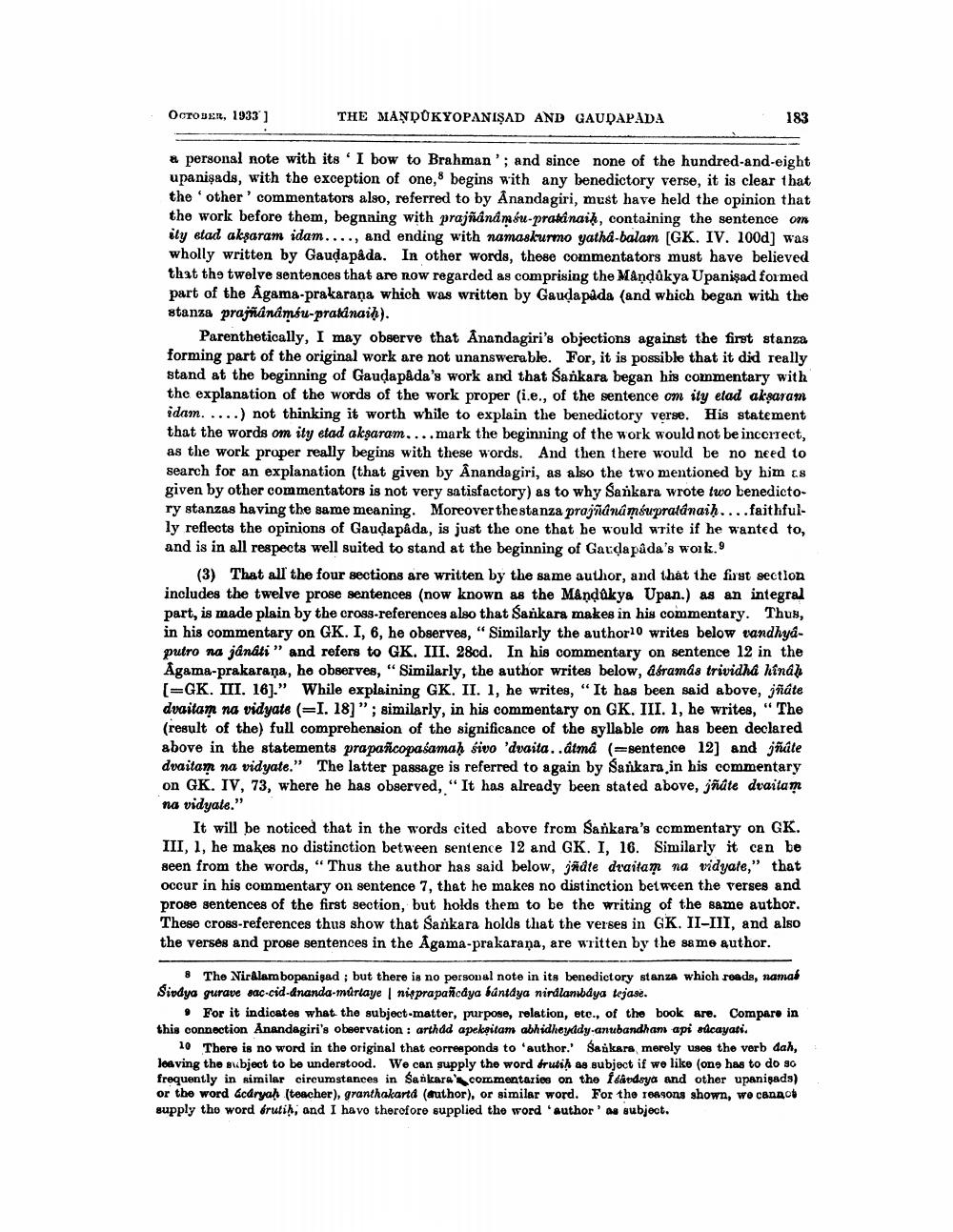________________
OCTOBER, 1933]
THE MANDOKYOPANIŞAD AND GAUPAPADA
183
a personal note with its ' I bow to Brahman'; and since none of the hundred-and-eight upanişads, with the exception of one,& begins with any benedictory verse, it is clear that the other commentators also, referred to by Anandagiri, must have held the opinion that the work before them, begnaing with prajñaná níu-pratinaik, containing the sentence om ity stad akşaram idam...., and ending with namaskurmo yatha-balam [GK. IV. 100d) was wholly written by Gaudapada. In other words, these commentators must have believed that the twelve sentences that are now regarded as comprising the Mandûkya Upanişad formed part of the Agama-prakarana which was written by Gauda pada (and which began with the stanza prajñanambu-prakánaih).
Parenthetically, I may observe that Anandagiri's objections against the first stanza forming part of the original work are not unanswerable. For, it is possible that it did really stand at the beginning of Gauda pada's work and that Sankara began his commentary with the explanation of the words of the work proper (i.e., of the sentence om ity elad aksaram idam. ....) not thinking it worth while to explain the benedictory verse. His statement that the words om ity etad aksaram.... mark the beginning of the work would not be incorrect, as the work proper really begins with these words. And then there would be no need to search for an explanation (that given by Anandagiri, as also the two mentioned by him is given by other commentators is not very satisfactory) as to why Sankara wrote two benedictory stanzas having the same meaning. Moreover thestanza prajñanámsupratánaiḥ....faithfully reflects the opinions of Gauda på da, is just the one that he would write if he wanted to, and is in all respects well suited to stand at the beginning of Gardapada's work.'
(3) That all the four sections are written by the same author, and that the first section includes the twelve prose sentences (now known as the Mandokya Upan.) as an integral part, is made plain by the cross-references also that Sankara makes in his commentary. Thus, in his commentary on GK. I, 6, he observes, “Similarly the author20 writes below vandhyaputro na janati” and refers to GK. III, 28cd. In his commentary on sentence 12 in the Agama-prakarana, he observes, “Similarly, the author writes below, asramas trividha hinah [GK. III. 16)." While explaining GK. II. 1, he writes, “It has been said above, jñáte dvaitam na vidyate (=I. 18]”; similarly, in his commentary on GK. III. 1, he writes, "The (result of the) full comprehension of the significance of the syllable om has been declared above in the statements prapancopaśamah sivo 'dvaita. .atma (=sentence 12] and jñáte dvaitan na vidyate." The latter passage is referred to again by Sankara in his commentary on GK. IV, 73, where he has observed, "It has already been stated above, jñáte dvaitam na vidyate."
It will be noticed that in the words cited above from Sankara's commentary on GK. III, 1, he makes no distinction between sentence 12 and GK. I, 16. Similarly it can be seen from the words, "Thus the author has said below, jñáte draitam na vidyate," that occur in his commentary on sentence 7, that he makes no distinction between the verses and prose sentences of the first section, but holds them to be the writing of the same author. These cross-references thus show that Sankara holds that the verses in GK. II-III, and also the verses and prose sentences in the Agama-prakarana, are written by the same author.
& The Niralambopanişad ; but there is no personal note in its benedictory stanza which reads, namas Sivdya gurave sac-cid-Ananda-múriaye nisprapañcaya bảntdya nirdlanıbdya tejase.
. For it indicates what the subject matter, purpose, relation, etc., of the book are. Compare in this connection Anandagiri's observation : arthad apekṣitam abhidheyddy-anubandham api súcayati.
10 There is no word in the original that corresponds to "author.' Sankara merely uses the verb dah, leaving the subject to be understood. We can supply the word frutih as subject if we like (one has to do 90 frequently in similar circumstances in Sankara'corumentaries on the fardsya and other upanigads) or the word Gcáryah (teacher), granthakarta (author), or similar word. For the reasons shown, we canach supply the word érulih, and I havo therofore supplied the word "author' as subject.




